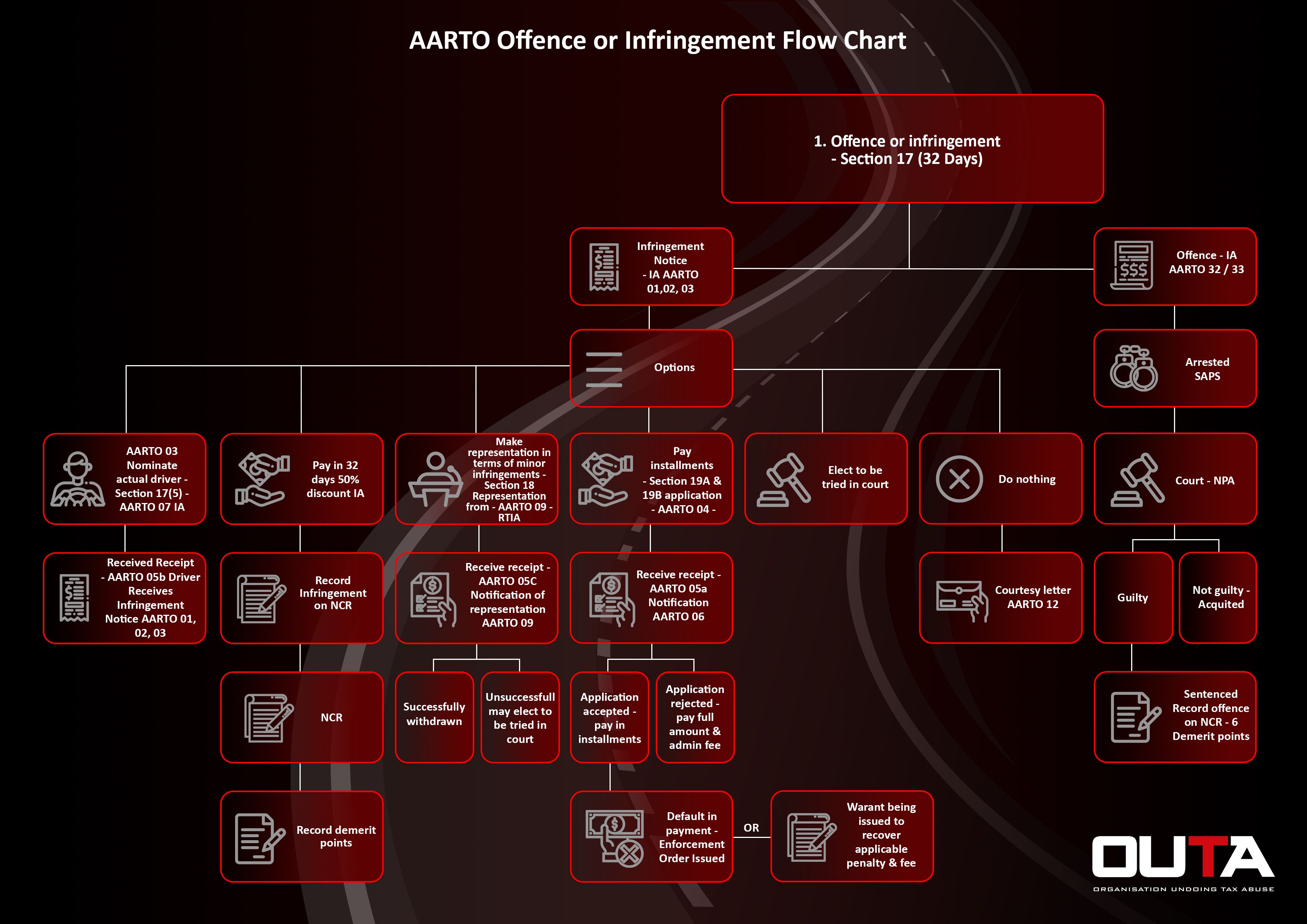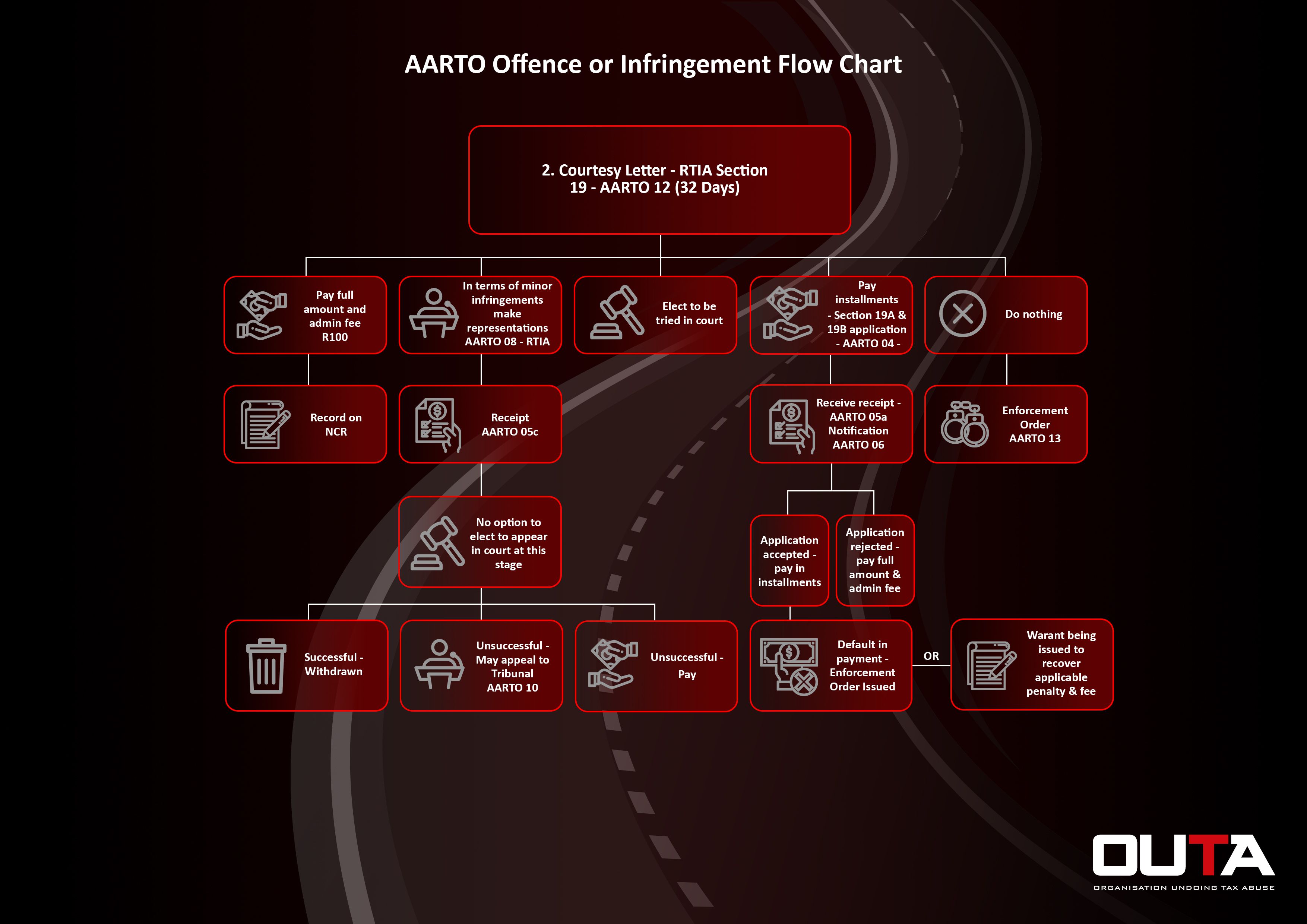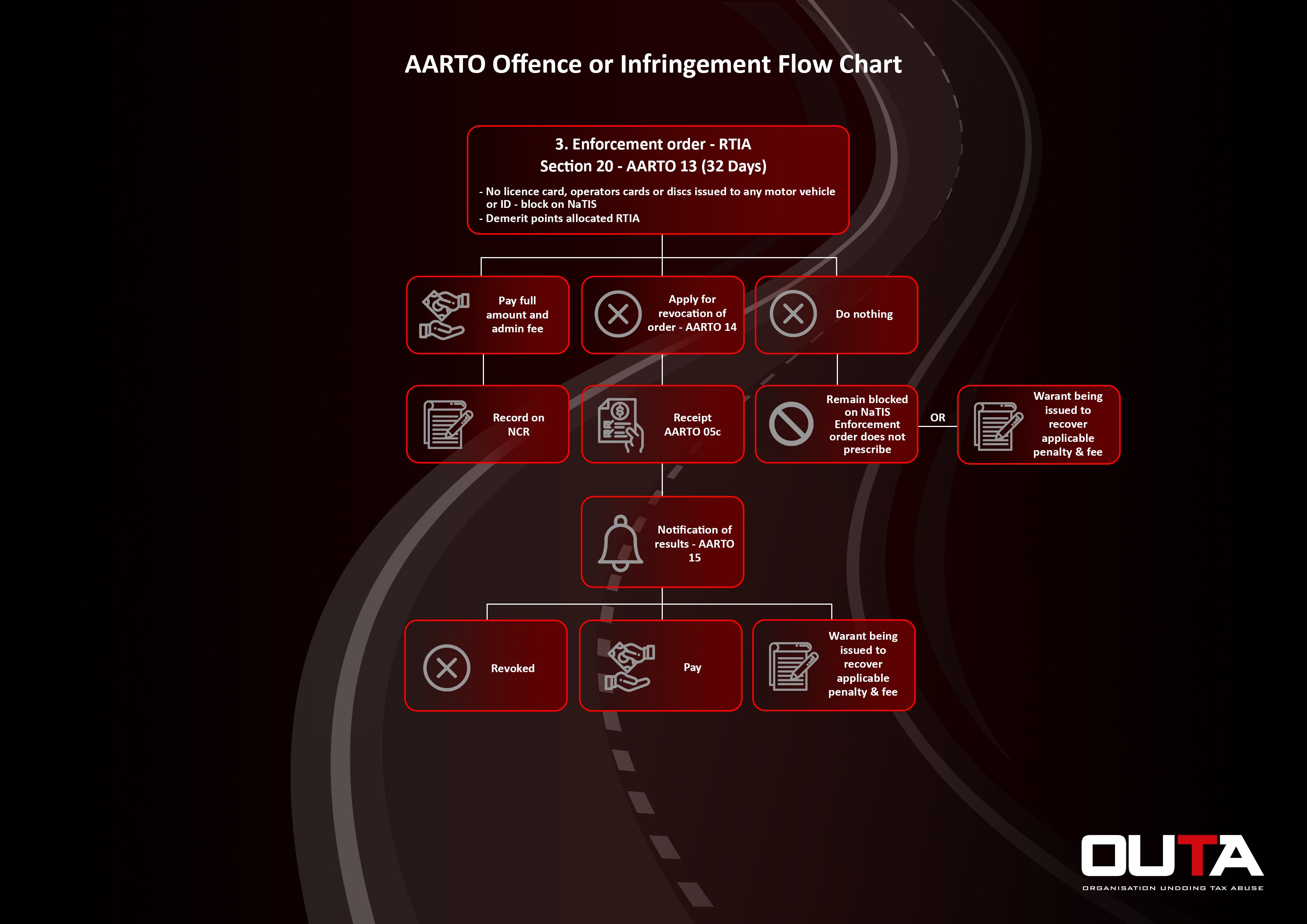OUTA challenged the constitutionality of the AARTO Act and AARTO Amendment Act in court.
This case was launched in July 2020 in the Pretoria High Court.
On 13 January 2022, the high court ruled in favour of OUTA, declaring the AARTO Act and Amendment Act unconstitutional and invalid.
A declaration of unconstitutionality must be confirmed by the Constitutional Court (Concourt) before it takes effect, so OUTA applied to the Concourt for this.
In July 2023, the Constitutional Court dismissed OUTA's legal challenge to the AARTO legislation, ruling it constitutional and legally valid. AARTO is now due to be rolled out nationally in July 2024.
See below for the details of these cases.
In July 2020, OUTA filed a court application calling for the AARTO Act and the AARTO Amendment Act to be declared unconstitutional. The application was issued in the Pretoria High Court and was brought against the Minister of Transport, the Minister of Cooperative Governance and Traditional Affairs, the Road Traffic Infringement Agency (RTIA) and the RTIA's Appeals Tribunal. By mid-September 2020, the Minister of Transport and the RTIA had filled notices to oppose the application and subsequently filed their opposing papers.
While OUTA believes that measures to improve road safety and reduce fatalities are urgently needed, we believe that the AARTO Amendment Act will not achieve this. AARTO pilot projects were started in the City of Johannesburg and the City of Tshwane in 2008 but failed (see reports on these projects submitted to Parliament's Portfolio Committee of Transport in November 2016 here). Statistics do not support the claim that it will lead to a reduction in fatalities on roads.
The application called for the court to declare both the main act and the amendment unconstitutional. This is because this legislation unlawfully intrudes upon the exclusive executive and legislative competence of the local and provincial governments envisaged in the Constitution. If the court finds that the law is not inconsistent with the Constitution, then OUTA further opposes Section 17 of the Amendment Act. This removes the requirement that service of notices and related documents must be done personally or by registered mail, instead allowing the uses of email, SMS or voice message.
OUTA’s Constitutional Challenge was heard on 18 October 2021, before the Honourable Judge Basson in the North Gauteng High Court. Judge Basson delivered her judgment on 13 January 2022 and agreed with OUTA’s submission that both the AARTO Act and the AARTO Amendment Act, should be declared unconstitutional and invalid. OUTA will approach the Constitutional Court to confirm the High Court’s Judgment, declaring both the act unconstitutional an invalid.
The OUTA Notice of Motion and Founding Affidavit outlining the case in the Pretoria High Court are here.
The state opposed the application. The answering affidavit for the First Respondent (Minister of Transport) is here: Part 1 and Part 2. The answering affidavit for the Third Respondent (RTIA) is here.
The case was set down in the Pretoria High Court for 18 and 19 October 2021, the Notice of Set down (Special Allocation) is here.
On 13 January 2022, the Pretoria High Court ruled in favour of OUTA, declaring the AARTO Act and the AARTO Amendment Act unconstitutional and invalid. The judgment is here and OUTA's statement at the time is here.
On 3 February 2022, OUTA applied to the Constitutional Court for confirmation of the Pretoria High Court ruling (the Concourt must confirm any judgment declaring a law to be unconstitutional). The application is here.
By mid-April 2022, there were three three legal actions in the Concourt and confusion over whether government is defending its law. In September 2022, a fourth action was added. These actions are detailed below. The Concourt heard the matters together on 15 November 2022.
Concourt application 1: OUTA’s application for confirmation (CCT 19/2022)
On 3 February, OUTA applied to the Concourt for confirmation of the Pretoria High Court ruling. OUTA’s application is in terms of Rule 16(4) of the Constitutional Court Rules, which deals with confirmation of an order of constitutional invalidity.
Rule 16(4) states that those seeking to confirm an order of unconstitutionality shall, within 15 days of the order, lodge an application for confirmation with the Concourt; the matter shall be disposed of in accordance with directions given by the Chief Justice.
The four respondents (the Minister of Transport, the Minister of Cooperative Governance and Traditional Affairs, the Road Traffic Infringement Authority, and the RTIA Appeals Tribunal) had 15 days to file a notice of intention to oppose OUTA’s application.
Only on 24 February, the Minister of Transport filed notice of intention to oppose. The Minister then had 15 days to file an answering affidavit, but OUTA received the Minister's affidavit only on 6 May 2022. The Concourt subsequently condoned this late filing.
On 28 July 2022, the Constitutional Court provided OUTA with the Directive on how to proceed with the matter, setting it down for 15 November 2022 (see below – "The Concourt Directive setting out the way forward" – for details of this).
Concourt application 2: The notice to appeal
On 7 February, the Minister of Transport and the RTIA separately filed their notices of appeal at the Concourt, setting out the reasons they wish to appeal the high court ruling. This is separate to OUTA’s confirmation application and follows a different process in the Concourt.
The same day, OUTA filed a notice of intention to oppose the appeal.
The Minister’s application is also brought in terms of Rule 16, but a different section. Rule 16(2) states that those who want to appeal against an order of constitutional invalidity should lodge a notice of appeal – and the grounds for the appeal – with the Concourt within 15 days of the court’s order of invalidity; the matter shall be disposed of in accordance with directions given by the Chief Justice. This is included in the directive of 28 July, setting down the matter for 15 November 2022.
Concourt application 3: RTMC intervention
On 8 March, the Road Traffic Management Corporation (RTMC), a state-owned entity that reports to the Minister of Transport, applied to the Concourt for permission to intervene and be joined as the fifth respondent in the case. The RTMC wants to join the appeal against the high court judgment; failing that, the RTMC wants to oppose OUTA’s application for confirmation of constitutional invalidity.
The RTMC was not party to the high court case, and this is the first indication it is interested in the matter.
On 15 March, OUTA filed notice of intention to oppose the RTMC’s intervention application and, on 7 April, filed an answering affidavit in support of this.
In the directive of 28 July 2022, the Concourt admitted the RTMC as the fifth respondent.
Concourt application 4: City of Cape Town amicus curiae application
On 28 September 2022, the City of Cape Town applied to the Concourt for admission as an amicus curiae (friend of the court) in the matter. The City supports the declaration of invalidity, arguing in respect of the intrusion of AARTO on the executive competence of local government.
On 28 October 2022, the Concourt approved the City's application. The Concourt order is here.
The City has until 2 November 2022 to file written submissions and any parties wishing to respond have until 9 November.
The Concourt Directive setting out the way forward on all three matters
On 28 July 2022, the Constitutional Court provided OUTA with the Directive on how to proceed with case CCT 19/22 (see here).
This Directive sets down to be heard on 15 November 2022, effectively combines all three matters, admits the RTMC as the fifth respondent, condones the late filing of the Minister's answering affidavit, directs OUTA to send written arguments to the Concourt on or before 9 September 2022, and directs the five respondents (the two ministers, the RTIA, the RTIA Appeals Tribunal and the RTMC) to send written arguments – including merits of their appeals – to the Concourt on or before 22 September 2022.
The Concourt case: Here are the positions
Concourt 1: OUTA’s application for confirmation
The high court accepted the core submissions by OUTA. The judgment found that both AARTO acts were unconstitutional and invalid because by setting up a national system to enforce traffic and parking laws, AARTO usurps the exclusive executive authority of local government over local roads and the authority of provincial government over provincial roads.
In the confirmation application, OUTA asked for the matter to be decided as soon as possible, as government intends rolling out AARTO. If the invalidity is confirmed, OUTA asks for the acts to be set aside with immediate effect, to avoid the state incurring costs in rolling out AARTO.
The confirmation application papers:
- The January
2022 Pretoria High court judgment that declared AARTO unconstitutional is here and OUTA’s
comment at the time is here.
- OUTA’s
application to the Concourt to confirm the high court ruling on 3 February 2022
is here.
- Rule 16 of the
Concourt Rules is here.
- The Minister of
Transport’s notice to oppose of 24 February 2022 is here.
- The Minister of
Transport's answering affidavit, received by OUTA on 6 May 2022, is here.
- The Concourt
Directions of 28 July 2022 on the case are here.
Concourt 2: The notice to appeal
The notices by the Minister and the RTIA say that the high court erred in granting the declaration of constitutional invalidity.
The Minister’s notice says:
- Previously all
traffic contraventions were administered in terms of the Criminal Procedure Act
and AARTO was created to improve efficiency;
- AARTO
establishes a procedure for the adjudication of infringements, without taking
over enforcement powers of provinces and municipalities;
- Road traffic
regulation is a concurrent national and provincial legislative competence;
- The AARTO
process is administrative and is preceded by officers of relevant authorities
issuing infringement notices;
- AARTO does not
end the criminal process under the Criminal Procedure Act as this may be used
as a last resort;
- The high court
failed to identify the provisions in AARTO which should not have been included,
so did not make an order severing the constitutionally valid provisions from
the invalid provisions, instead declaring the entire AARTO Act and AARTO
Amendment Act invalid.
The RTIA notice says:
- The court erred
in finding that the question for determination is whether national government
has the competence to legislate on matters relating to provincial and municipal
roads;
- The court erred
in finding that AARTO creates a single national system of road traffic
regulation and seeks to regulate every aspect of road traffic;
- The court erred in finding that the
power to enforce traffic laws on municipal roads has historically been
conferred on municipalities;
- The court erred in finding that national
government competencies excluded those carved out by a “bottom up” approach,
which removed matters dealing with provincial roads or municipal roads, traffic
and parking.
The notice of appeal papers:
- The Minister of
Transport’s notice of appeal of 7 February 2022 is here.
- The RTIA notice
of appeal of 7 February 2022 is here.
- OUTA’s notice
of intention to oppose this of 7 February 2022 is here.
Concourt 3: RTMC intervention
The RTMC wants OUTA’s application for constitutional invalidity to be dismissed but, if OUTA succeeds, then the RTMC wants the declaration of invalidity to be suspended for 18 months to allow the law to be remedied.
The RTMC makes arguments which were not placed before the high court, saying this is not new evidence but rather context on the legislative scheme and the history of road traffic regulation.
The RTMC argument includes that:
- AARTO is at the
core of RTMC’s statutory mandate, it is an issuing authority under AARTO and
was established as a partnership between national, provincial and local
government on traffic issues;
- The RTMC should
have been cited as a respondent in the high court case;
- AARTO is not
concerned with matters related to provincial roads and traffic or municipal
roads and parking;
- The substance
and goals of AARTO are primarily concerned with road traffic regulation and
thus fall within the purview of national legislation;
- The history,
context, purpose, substance and goals of AARTO make it constitutionally valid;
-
The high court answered the wrong
constitutional question in its judgment.
OUTA's answering affidavit, by Advocate Stefanie Fick, includes this:
- The RTMC fails
to explain why it did not intervene in the high court case, which was launched
in the high court in July 2020 and heard in October 2021. “Between the
institution of the matter and the hearing, the litigation received extensive
publicity in national and regional newspapers, on radio and in news broadcasts
on television”. The media also reported on the court hearing in October 2021.
- The RTMC is a
state-owned enterprise whose shareholders are the Minister of Transport (the
first respondent in the matter) and the provincial MECs for Transport, who
serve on a shareholders committee that meets four times a year and is involved
in the governance of RTMC.
- “In light of
the close relationship between the Minister, the shareholders committee and the
RTMC, and the widespread media coverage of OUTA’s constitutional challenge to
AARTO and the Amendment Act, it is inconceivable that the RTMC was not aware of
the litigation when it was first instituted or that it did not become aware of
it before 18 October 2021, the date of the hearing in the high court,” says
Advocate Fick in her affidavit.
The intervention papers:
- The RTMC
application for intervention of 8 March is here and the
founding affidavit is here.
- OUTA’s notice
of intention to oppose of 15 March is here.
- OUTA’s
answering affidavit by Advocate Stefanie Fick of 7 April is here.
The Concourt granted the RTMC intervention, admitting it as the fifth respondent.
Concourt 4: The City of Cape Town amicus curiae application
The City supports the declaration of invalidity, arguing in respect of the intrusion of AARTO on the executive competence of local government.
The City says it is an issuing authority in terms of the AARTO Act. It calls for enforcement and adjudication in terms of the AARTO system to reside at the local government level not at national level. The City also says that AARTO adversely affects local government financial and fiscal powers, and that these matters were not raised in the high court case. Municipalities are only allowed to raise own revenues from sources assigned by the Constitution and in national legislation, and the City says AARTO both restricts its revenue from traffic fines and imposes additional operational expenditure on it.
The City's application and supporting affidavit are here.
The Concourt hearing of 15 November 2022: the arguments
All the outstanding applications will be heard on this date.
- The OUTA heads of argument, filed on 5
September 2022, are here.
- The RTMC heads of argument, filed on 28
September 2022, are here.
- The RTIA heads of argument, filed on 13
October 2022, are here.
- The Minister of Transport heads of argument,
filed on 14 October 2022, are here.
- The Concourt's media summary of the case,
written before the hearing of 15 November 2022, is here.
July 2023: Concourt rules AARTO is valid
On 12 July 2023, the Constitutional Court ruled that the AARTO legislation is constitutionally valid and thus legal, dismissing OUTA's legal challenge to the law.
The Concourt judgment was written by Chief Justice Raymond Zondo and was unanimous.
See more on this here.
The Concourt judgment is here and the Concourt's summary of the matter is here.


